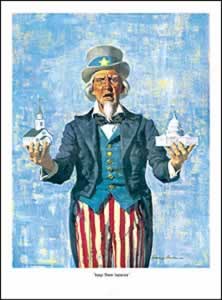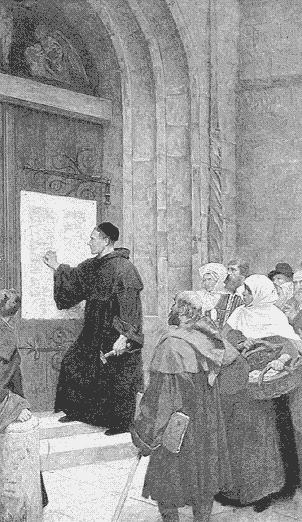Senator Goldwater stated: "The religious factions that are growing throughout our land are not using their religious clout with wisdom. They are trying to force government leaders into following their position 100 percent. If you disagree with these religious groups on a particular moral issue, they complain, they threaten you with a loss of money or votes or both. I'm frankly sick and tired of the political preachers across this country telling me as a citizen that if I want to be a moral person, I must believe in 'A,' 'B,' 'C,' and 'D.' Just who do they think they are? And from where do they presume to claim the right to dictate their moral beliefs to me? And I am even more angry as a legislator who must endure the threats of every religious group who thinks it has some God-granted right to control my vote on every roll call in the Senate. I am warning them today: I will fight them every step of the way if they try to dictate their moral convictions to all Americans in the name of 'conservatism.' " (1909-1998) US Senator (R-Arizona) Source: Congressional Record, September 16, 1981.
The five-term U.S. senator from Arizona was equally unimpressed with TV preacher Pat Robertson. When Robertson sought the GOP nomination for president in 1988, Goldwater wasn't about to say amen. "I believe in separation of church and state," observed Goldwater. "Now, he doesn't believe that . . . I just don't think he should be running."
A few years later he told The Advocate, "I don't have any respect for the Religious Right. There is no place in this country for practicing religion in politics. That goes for Falwell, Robertson and all the rest of these political preachers. They are a detriment to the country."
But Goldwater was also deeply worried about the Religious Right's long-term impact on his beloved GOP. "If they succeed in establishing religion as a basic Republican Party tenet," he told U.S. News & World Report in 1994, "they could do us in." In an interview with The Post that same year, Goldwater observed, "When you say 'radical right' today, I think of these moneymaking ventures by fellows like Pat Robertson and others who are trying to take the Republican Party and make a religious organization out of it. If that ever happens, kiss politics goodbye."
But most importantly, Goldwater was deeply concerned about the Religious Right's relentless war on the Constitution and basic American freedoms. In a Sept. 15, 1981 senate speech, Goldwater noted, "The uncompromising position of these groups is a divisive element that could tear apart the very spirit of our representative system, if they gain sufficient strength." Insisted Goldwater, "Being a conservative in America traditionally has meant that one holds a deep, abiding respect for the Constitution. We conservatives believe sincerely in the integrity of the Constitution. We treasure the freedoms that document protects. . . By maintaining the separation of church and state, the United States has avoided the intolerance which has so divided the rest of the world with religious wars . . . Can any of us refute the wisdom of Madison and the other framers? Can anyone look at the carnage in Iran, the bloodshed in Northem Ireland, or the bombs bursting in Lebanon and yet question the dangers of injecting religious issues into the affairs of state?"
Goldwater concluded with a waming to the American people: "The religious factions will go on imposing their will on others." "Unless the decent people connected to them recognize that religion has no place in public policy. They must learn to make their views known without trying to make their views the only alternatives. . . We have succeeded for 205 years in keeping the affairs of state separate from the uncompromising idealism of religious groups and we mustn't stop now." "To retreat from that separation would violate the principles of conservatism and the values upon which the framers built this democratic republic." Source
















0 comments:
Post a Comment